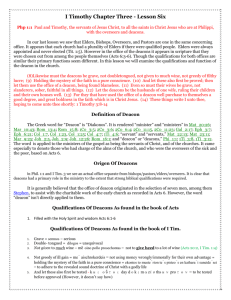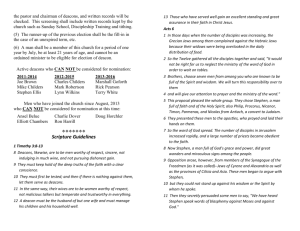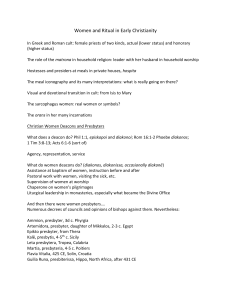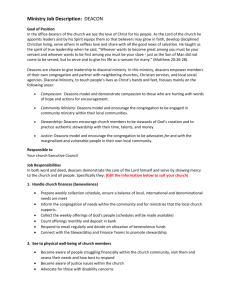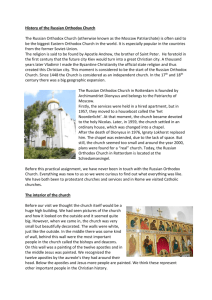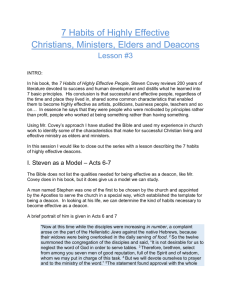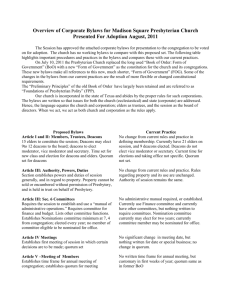Position Paper on Deacons and Female Deacons
advertisement
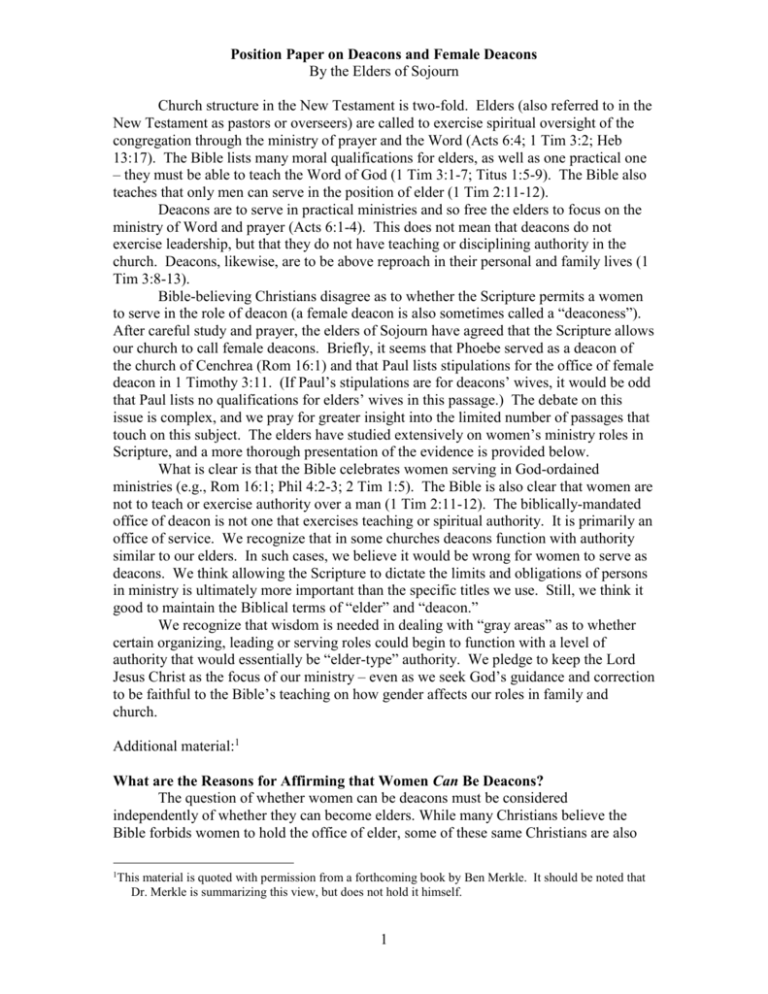
Position Paper on Deacons and Female Deacons By the Elders of Sojourn Church structure in the New Testament is two-fold. Elders (also referred to in the New Testament as pastors or overseers) are called to exercise spiritual oversight of the congregation through the ministry of prayer and the Word (Acts 6:4; 1 Tim 3:2; Heb 13:17). The Bible lists many moral qualifications for elders, as well as one practical one – they must be able to teach the Word of God (1 Tim 3:1-7; Titus 1:5-9). The Bible also teaches that only men can serve in the position of elder (1 Tim 2:11-12). Deacons are to serve in practical ministries and so free the elders to focus on the ministry of Word and prayer (Acts 6:1-4). This does not mean that deacons do not exercise leadership, but that they do not have teaching or disciplining authority in the church. Deacons, likewise, are to be above reproach in their personal and family lives (1 Tim 3:8-13). Bible-believing Christians disagree as to whether the Scripture permits a women to serve in the role of deacon (a female deacon is also sometimes called a “deaconess”). After careful study and prayer, the elders of Sojourn have agreed that the Scripture allows our church to call female deacons. Briefly, it seems that Phoebe served as a deacon of the church of Cenchrea (Rom 16:1) and that Paul lists stipulations for the office of female deacon in 1 Timothy 3:11. (If Paul’s stipulations are for deacons’ wives, it would be odd that Paul lists no qualifications for elders’ wives in this passage.) The debate on this issue is complex, and we pray for greater insight into the limited number of passages that touch on this subject. The elders have studied extensively on women’s ministry roles in Scripture, and a more thorough presentation of the evidence is provided below. What is clear is that the Bible celebrates women serving in God-ordained ministries (e.g., Rom 16:1; Phil 4:2-3; 2 Tim 1:5). The Bible is also clear that women are not to teach or exercise authority over a man (1 Tim 2:11-12). The biblically-mandated office of deacon is not one that exercises teaching or spiritual authority. It is primarily an office of service. We recognize that in some churches deacons function with authority similar to our elders. In such cases, we believe it would be wrong for women to serve as deacons. We think allowing the Scripture to dictate the limits and obligations of persons in ministry is ultimately more important than the specific titles we use. Still, we think it good to maintain the Biblical terms of “elder” and “deacon.” We recognize that wisdom is needed in dealing with “gray areas” as to whether certain organizing, leading or serving roles could begin to function with a level of authority that would essentially be “elder-type” authority. We pledge to keep the Lord Jesus Christ as the focus of our ministry – even as we seek God’s guidance and correction to be faithful to the Bible’s teaching on how gender affects our roles in family and church. Additional material:1 What are the Reasons for Affirming that Women Can Be Deacons? The question of whether women can be deacons must be considered independently of whether they can become elders. While many Christians believe the Bible forbids women to hold the office of elder, some of these same Christians are also 1 This material is quoted with permission from a forthcoming book by Ben Merkle. It should be noted that Dr. Merkle is summarizing this view, but does not hold it himself. 1 Position Paper on Deacons and Female Deacons By the Elders of Sojourn convinced that women can hold the office of deacon. In the following pages, we will consider the most common arguments given in favor of allowing women to be deacons. In particular, we will present the arguments related to three crucial texts: 1 Timothy 3:11; 1 Timothy 2:12; and Romans 16:1–2. 1 Timothy 3:11 In 1 Timothy 3:8–13, Paul lists the qualifications needed for a man to become a deacon. In verse 11, however, he introduces the requirements needed for “women.” According to the NRSV, Paul states, “Women likewise must be….” The ESV, on the other hand, reads, “Their wives likewise must be….” The question is whether Paul is speaking of the requirements for the wife of a deacon or for a woman deacon. The following arguments suggest that Paul has the latter in mind. (1) The Greek term gunaikas (from the word gunē) can either refer to “women” or more specifically to “wives”—the distinction can only be determined by the context. If Paul was referring the wives of the deacons, he could have indicated his intention by adding the word “their” (“Their wives likewise…”). Because the Greek does not contain the word “their” (although it is included in many English translations), it is best to translate the original text simply as “women.” In this case, Paul is introducing another office and is not merely referring to the wives of deacons. (2) Paul begins verse 11 in a manner similar to verse 8, which introduces a new office. In verses 1–7, Paul identifies the qualification needed for anyone aspiring to the office of overseer. When Paul begins the next section which introduces the office of deacon, he states, “Likewise deacons…” (v. 8). The point to be made is that verse 11 begins in the same manner which suggests that another office (deaconess) is being introduced. The flow of Paul’s writing then becomes evident: “…an overseer must be (v. 2)…deacons likewise must be (v. 8)…women [deacons] likewise must be (v. 11)….” In verses 12 and 13, which refer again to qualifications for male deacons, is additional information that Paul adds as an afterthought, causing a disjointed unit. (3) Another reason which suggests that Paul is not speaking about deacons’ wives, but rather about women deacons, is that the qualifications for overseers do not include any reference to their wives. It does not seem likely that Paul would add a special requirement for the wife of a deacon when the more important office of overseer has no such requirement. Thus, it does not seem likely that Paul would have stricter requirements for deacons than he does for elders. 1 Timothy 2:12 Many Christians are opposed to allowing women to become deacons because, according to 1 Timothy 2:12, Paul forbids a woman “to teach or exercise authority over a man.” And because all offices in the church, including the office of deacon, possess an inherit authority, women are not permitted to hold such offices. There are two main responses to this dilemma which would still allow women to be deacons. First, Paul’s prohibition could be limited due to cultural reasons. That is, Paul prohibits women from teaching and having authority over men because the women of Ephesus were either uneducated or were teaching false doctrine (or both). Therefore, in the case where women are educated and are not teaching false doctrine, Paul’s prohibition does not apply. A second response is that the ministry of deacons is by nature of ministry of 2 Position Paper on Deacons and Female Deacons By the Elders of Sojourn service which does not require women to teach or exercise authority over men and would thus not violate Paul’s prohibition. Unlike the elders, deacons do not need to be “able to teach” (1 Tim 3:2) because their ministry does not involved teaching. Furthermore, it could be argued that the office of deacon is not an authoritative office due to the nature of their service-oriented ministry. Deacons are not called to lead the church, but to serve the church. Therefore, the two prohibitions given by Paul in 1 Timothy 2:11 are not violated by allowing women to become deacons. Romans 16:1–2 In this text, Paul commends Phoebe to the church at Rome and calls her a diakonos “of the church at Cenchreae.” There are at least three reasons which support the view that this reference of diakonos should be translated “deacon,” referring to an officeholder and not merely one who is a “servant.” (1) Paul uses the masculine form diakonos to refer to a woman. Thus, it can be argued that Paul is not using the term generally referring one who is a servant, but has a specific “office” in mind. The masculine form of diakonos used of a woman, suggests that the term became standardized when referring to an office. (2) When the generic meaning of diakonos (i.e., “servant”) is intended, the text usually reads, “servant of the Lord” or something similar. This is the only place Paul speaks of someone being a diakonos of a local church. Tychicus is called a “servant in the Lord” (Eph 6:21), Epaphras is named a “servant of Christ” (Cor 1:7), and Timothy is labeled “a servant of Christ Jesus” (1 Tim 4:6). Because only Phoebe is specifically said to be a servant of a local congregation (the church at Cenchreae), it is likely that she was a “deacon” of her church. (3) Phoebe is sent to perform an official task on behalf of the Apostle Paul and her church. Paul commends her to the church at Rome and urges the Roman Christians to aid her since she is about the important business of the church. He asks that they “welcome her in the Lord in a way worthy of the saints, and help her in whatever she may need…, for she has been a patron of many and of myself as well” (Rom 16:2). Thus, it is argued that such an official task requires an official office.2 Summary The conclusion drawn from the above data is that women can be deacons in the church. In 1 Timothy 3:11, Paul gives the qualifications for women deacons and in Romans 16:1 specially names Phoebe, a sister in the Lord, a “deacon of the church at Cenchreae.” Furthermore, allowing women to become deacons does not violate Paul’s prohibition in 1 Timothy 2:11 since a deacon does not “teach or exercise authority” in the church. 2 Many scholars posit that Phoebe was in fact the bearer of the letter of Romans (so C. E. B Cranfield, A Critical and Exegetical Commentary on the Epistle to the Romans, vol. 3, International Critical Commentary [Edinburgh: T&T Clark, 1979], 780; Murray, Romans, 226; Douglas J. Moo, The Epistle to the Romans, New International Commentary on the New Testament [Grand Rapids: Eerdmans, 1996], 913; Peter Stuhlmacher, Paul’s Letter to the Romans, trans. Scott J. Hafemann [Louisville: Westminster/John Knox, 1994], 246; F. F. Bruce, The Letter of Paul to the Romans, rev. ed., The Tyndale New Testament Commentaries, vol. 6 [Leicester, England: InterVarsity; Grand Rapids: Eerdmans, 1985], 252). 3
